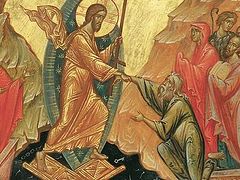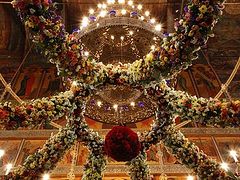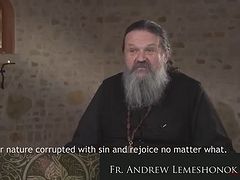On Pascha, a man removes the bridle from the horse of his body, and no longer holding back, rushes off somewhere. As a rule, the master of the horse, that is, the man himself, has no idea where the long-suppressed desire will take him. Fr. Andrei Chizhenko talks about what is important to remember during these days.
The famous Soviet film director Ivan Pyryev, who made films based on the novels The Idiot and The Brothers Karamazov by Fyodor Dostoyevsky, told the following story about his childhood…
He was born in an Old Believer family. His relatives would come to their house on Forgiveness Sunday before Great Lent. They would solemnly cross themselves, kneel before one another, prostrate to the ground, and ask forgiveness of one another with the words: “Forgive me for the sake of Christ.” Then they went to church together for the service. Later, back home, they would sit down at the table. And here would begin the second—dark—half of the get-together. His relatives would get terribly drunk, then there would be a fight. And at the end of Forgiveness Sunday, his relatives, embittered at one another, would go to their own villages. During one of these fights, Pyryev’s father was killed.
I’m telling this story to say that in our broad, multi-faceted Slavic souls, great Christian pious feelings are often joined with pagan drunken revelry.[1] The latter especially breaks out like steam from a boiling teapot during the feasts.
Let’s say a man restrained himself long and honestly during Great Lent. He tried to more or less lead a pious and repentant life. Then after Pascha he was given the “green light,” and he stopped humbling himself. The coil straightened out with powerful kinetic energy. The result—in the worst case: indigestion, the hospital, or binging throughout Bright Week. And in a few days, he cancels all the achievements of Lent. Why does this happen?
Because he often has an incorrect attitude towards Lent, thinking of it as regulatory-mechanical: Don’t eat this, comply with that, and so on. And then, not trying to change his internal spiritual nature, to correct it, calling to God for help, he tries to curb his passions by his own willpower, but not uprooting them in the depths of his heart, but restraining them somewhere on the surface. Therefore, on the feasts—Pascha or the Nativity of Christ—he removes the bridle from the horse of his body and no longer holding back, rushes off somewhere. As a rule, the master of the horse, that is, the man himself, has no idea where such long-repressed desire will take him.
In his book My Life in Christ, Holy Righteous John of Kronstadt wrote: “The feasts should have an impact on our lives, they should revive and kindle our faith (heart) in future blessings, and nourish pious, good morals. The feasts are spent more often in sin, as they are met by an unreasonable lack of faith, a cold heart, often not at all prepared for the feeling of these great blessings of God, which God has given through a well-known celebrated person or event.”
The feasts should have an impact on our lives. Through them the Lord changes and heals our spiritual nature. That’s the point of the feast. We have to respond to this call of the Most-High and not return to laziness, drunkenness, and gluttony. That doesn’t mean, of course, not letting the body rest. That’s also necessary—especially in Bright Week. But all good things should be in moderation. It doesn’t mean leaving church after the Paschal service and forgetting the road to the church. We’ll just eat, drink, make merry. No, life in Christ continues, as does the fight with the devil, with our passions. After all, on the contrary, satan begins to catch us when we relax.
“Glory to God, I had Communion,” he thinks.
But the demons are already waiting to knock him off his feet.
“Glory to God, I made it to the Bright Resurrection of Christ. Now I’m going to enjoy myself!” the faster thinks.
But satan’s already waiting for him to break the fast in such a way as to cancel all his effort and labors.
Therefore, dear brothers and sisters, let us have not carnal but spiritual goals before us. It’s important in Bright Week not to slide downwards, but with God’s help to continue the persistent, difficult ascent upwards—to the Kingdom of Heaven.
For those who want to participate in the Divine services in Bright Week and commune of the holy Mysteries of Christ, I would like to say a few words about preparation for the Eucharist in this period. We don’t keep a food fast—it’s forbidden by the Church. We observe only the Eucharistic fast: from midnight till the point of communing. Instead of the canons of preparation we read the canon for holy Pascha, and instead of the morning and evening prayers—the Paschal Hours. This order for holy Communion isn’t dropped—it’s obligatory for those preparing for the Eucharist during Bright Week as well.
Let us not, dear brothers and sisters, cancel out our Great Lenten efforts and labors. The main thing is to change our heart, to unite in soul with our Lord Jesus Christ through the feasts, including the Bright Resurrection of Christ. We have to ask God to help us, the foolish, to remain in the light of His Divinity, and not to fall into the mud of drunkenness and gluttony.
We should break the fast, rest, be with our loved ones, and share the Paschal joy with them—but also remember that the MAIN achievement of Pascha is our resurrecting, renewed soul. Let us not again trample it into the filth of the passions.





Until many of our hierarchs and priests acknowledge this as legalistic and non-Orthodox, few faithful will find another way.